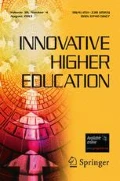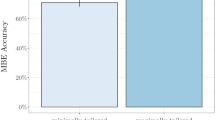Abstract
This research examines the effect of two testing strategies on academic achievement and summative evaluations in an introductory statistics course. In 2001, 63 students underwent an hourly midterm format; and in 2002, 68 students underwent a bi-weekly exam format. Other than the exam format, the class lectures and labs were identical in terms of content, structure, pace, and the cumulative final exam. Findings from the regression analyses show that students in the bi-weekly format performed better than the students in the hourly midterm format. On average, students who took the bi-weekly exams performed about 10 percentage points higher (one letter grade) on the exams during the semester and about 15 percentage points higher on the cumulative final exam compared to their peers who took hourly midterms. The benefits of the bi-weekly format were significantly greater among female students than male students. Finally, students in the bi-weekly format were less likely to drop the class and evaluated the class far more favorably.

Similar content being viewed by others
References
Angelo, T. A., & Cross, K. P. (1993). Classroom assessment techniques: A handbook for college teachers. San Francisco, CA: Jossey-Bass.
Baumeister, R., Bratslavsky, E., Maraven, M., & Tice, D. (1998). Ego depletion: Is the active self a limited resource? Journal of Personality and Social Psychology, 74, 1252–1265.
Chickering, A. W., & Gamson, Z. F. (Eds.) (1991). Applying the seven principles for good practice in undergraduate education. New directions for teaching and learning. No.47. San Francisco, CA: Jossey-Bass.
Covington, M. V. (1992). Making the grade: A self-worth perspective on motivation and school reform. New York, NY: Cambridge University Press.
Donovan, J. J., & Radosevich, D. J. (1999). A meta-analytic review of the distribution of practice effect: Now you see it, now you don’t. Journal of Applied Psychology, 84, 795–805.
Graham, R. B. (1999). Unannounced quizzes raise test scores selectively for mid-range students. Teaching of Psychology, 26, 271–273.
Guskey, T. R. (2003). How classroom assessments improve learning. Educational Leadership, 60, 6–11.
Haberyan, K. A. (2003). Do weekly quizzes improve student performance on general biology exams? The American Biology Teacher, 65, 110–114.
Hakel, M. D. (1997). What we must learn from Alverno. About Campus, 2 (July/August), 16–21.
Hancock, D. R. (2001). Effects of test anxiety and evaluative threat on students’ achievement and motivation. Journal of Educational Research, 94, 284–290.
Huba, M. E., & Freed, J. E. (2000). Learner-centered assessment on college campuses: Shifting the focus from teaching to learning. Boston, MA: Allyn & Bacon.
Kohn, A. (1993). Punished by rewards: The trouble with gold stars, incentive plans, A’s, praise, and other bribes. New York, NY: Houghton Mifflin.
Kuh, G. D., & Hu, S. (2001). The effects of student–faculty interaction in the 1990s. The Review of Higher Education, 24, 309–322.
Linn, R. L. (2001). A century of standardized testing: Controversies and pendulum swings. Educational Assessment, 7, 29–38.
Orpen, C. (1998). The causes and consequences of academic procrastination: A research note. Westminster Studies in Education, 21, 73–75.
Pajares, F. (1996). Self-efficacy beliefs in academic settings. Review of Educational Research, 66, 543–578.
Ruscio, J. (2001). Administering quizzes at random to increase students’ reading. Teaching of Psychology, 28, 204–206.
Seymour, E., & Hewitt, N. M. (1997). Talking about leaving: Why undergraduates leave the sciences. Boulder, CO: Westview.
Stiggins, R. J. (2001). Student-involved classroom assessment. Upper Saddle River, NJ: Prentice-Hall.
Tuckman, B. W. (1996). The relative effectiveness of incentive motivation and prescribed learning strategies in improving college students’ course performance. The Journal of Experimental Education, 64, 197–210.
Tuckman, B. W. (1998). Using tests as an incentive to motivate procrastinators to study. The Journal of Experimental Education, 66, 141–147.
Willingham, D. T. (2002). Allocating student time: “Massed” versus “distributed” practice. American Educator, 26, 37–39.
Author information
Authors and Affiliations
Corresponding author
Additional information
Carrie B. Myers is an Assistant Professor of Adult and Higher Education at Montana State University. She received her Ph.D. in Higher Education Administration from Washington State University. Her research focuses on student and faculty development and assessment and evaluation.
Scott M. Myers is an Associate Professor of Sociology at Montana State University. His areas of research are family demography and education. He received a Ph.D. in Sociology and a Ph.D. in Demography from the Pennsylvania State University.
Rights and permissions
About this article
Cite this article
Myers, C.B., Myers, S.M. Assessing Assessment: The Effects of Two Exam Formats on Course Achievement and Evaluation. Innov High Educ 31, 227–236 (2007). https://doi.org/10.1007/s10755-006-9020-x
Published:
Issue Date:
DOI: https://doi.org/10.1007/s10755-006-9020-x




